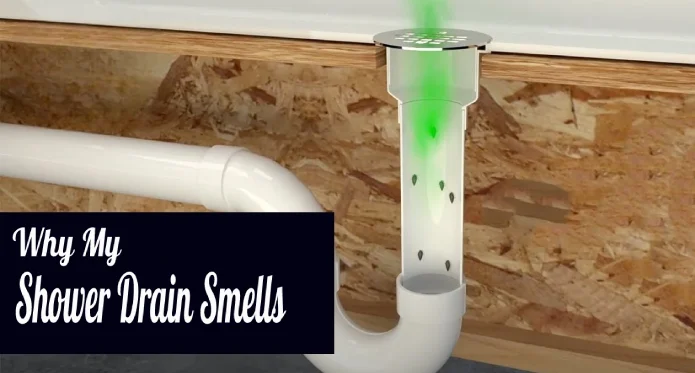Last Updated on November 14, 2023
Smelling an unpleasant odor emanating from your shower drain is quite annoying and a problem many homeowners encounter.
One of the most common causes of shower drain smells is mold growth. Mold, thriving beneath the drain cover, releases gases with that telltale musty smell, potentially posing health risks if inhaled.
Another common culprit behind the mysterious stench is clogged drains. The accumulation of soap scum, hair, and debris often causes a clogged drain. It can lead to the decomposition of trapped particles, resulting in equally unwelcome odors.
These issues are unpleasant and can make your shower experience far from enjoyable.
We will discuss in detail why your shower drain may emit an unpleasant odor. Also, we suggest practical solutions to eliminate those unwelcome odors to ensure you have an enjoyable and refreshing showering experience.
Why My Shower Drain Smells: Reasons and Solutions
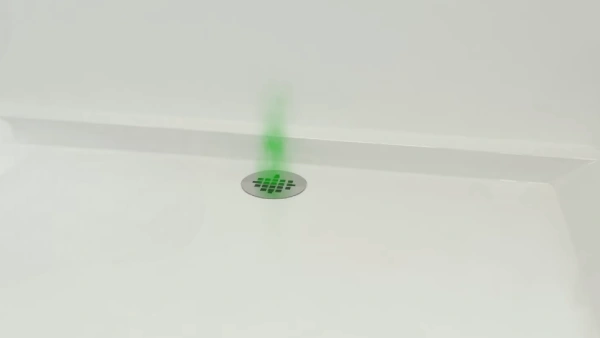
If you’re wondering why your shower drain smells, there could be a few reasons that need your attention.
- Mold growth
- Clogged drain
- Dry p-trap
- Biofilm buildup
- Leaky pipes
- Contaminated water
- Hydrogen sulfide gas
- Improper ventilation
Check out the reasons for shower drain odors in detail and the solutions to get rid of them.
1. Mold Growth
If you notice a musty odor coming from your shower drain, it is highly likely that mold is growing beneath the drain cover.
Mold spores produce gasses that emit a distinct musty odor, which can have negative effects on your health if inhaled.
To tackle this issue, create a paste using equal parts of baking soda and water. Apply the paste on the shower drain using an old toothbrush and then scrub the drain thoroughly after ten minutes.
Afterward, boil ten quarts of water at 140-150 degrees Fahrenheit and pour it slowly down the drain to get rid of any mold that’s left.
You can also pour a mixture of vinegar and baking soda down the drain to address any lingering odors.
2. Clogged Drain
A clogged drain can also be the culprit of that unpleasant smell coming from your shower drain. Trapped particles of dirt, soap scum, hair, and debris can accumulate and start decomposing, leading to unpleasant odors.
To address a clogged drain, try using a drain snake or auger to remove the clog. If that does not work, you can pour boiling water down the drain to dissolve any buildup of grease and soap residue.
However, as a last resort, you can consider using chemical drain cleaners to eliminate clogs and odors.
3. Dry P-Trap
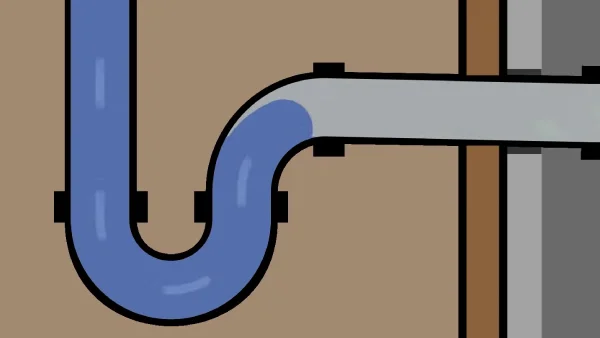
Infrequent use of your shower can cause water in the P-trap to evaporate, which can cause sewer gasses to escape and produce offensive odors.
To avoid dry P-trap odors, run water down the drain often to replenish the P-trap. It is also advisable to pour a cup of water down the drain and wait an hour to ensure the trap remains sealed.
For showers that don’t get a lot of use, you can add four ounces of mineral or cooking oil to the P-trap to slow water evaporation.
4. Biofilm Buildup
If your shower drain smells like something is rotting, you may have biofilm buildup.
A slimy layer of bacteria can accumulate inside the drain due to soap, shampoo, and body oils, resulting in unpleasant odors.
You can do some things to eliminate biofilm and its associated odor. You can pour a mixture of 1 part bleach and 1 part water down the drain.
Alternatively, you can use a combination of 1 cup of baking soda followed by 1 cup of white vinegar and flush with hot water.
5. Leaky Pipes
Leaky pipes within your shower’s drainage system can cause a variety of problems, including bad odors. If you smell something that resembles rotten eggs coming from your shower drain, you might have leaking pipes.
Unfortunately, DIY fixes are not recommended as they may require specialized tools and expertise.
It’s best to contact a professional plumber to inspect and repair the pipes. They will be able to diagnose the problem and provide you with the best course of action for repairing the problem.
6. Hydrogen Sulfide Gas
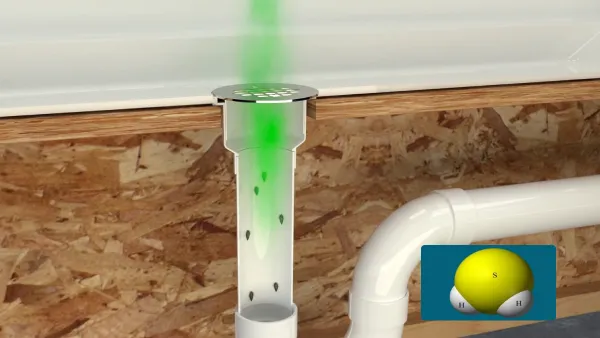
You may notice a smell of sewage or rotten eggs, indicating the presence of hydrogen sulfide gas. Although not harmful in small amounts, this odor suggests a problem in your drainage system.
Hydrogen sulfide gas is produced when organic matter decomposes in the absence of oxygen, such as in clogged pipes or stagnant water.
To address this issue, pour half a cup of baking soda followed by a cup of vinegar or half a cup of bleach into the sink drain.
7. Improper Ventilation
Another common reason your shower drain may emit an unpleasant odor is poor ventilation in your bathroom.
Without proper airflow, moisture from showering can accumulate and promote the growth of mold and mildew, which not only cause odors but can also pose health risks.
One way to address this issue is to install or upgrade your bathroom fans to remove excess moisture. You can also open windows or use exhaust systems to reduce humidity in the room.
Another effective solution is to use moisture-absorbing products like dehumidifiers or moisture-activated air fresheners. These can help to maintain a fresh-smelling bathroom and prevent the development of mildew and mold.
Is a musty smell in the shower drain harmful if inhaled?
Breathing in the musty smell from your shower drain can potentially cause health issues like headaches, nausea, dizziness, and fatigue.
This smell often indicates active mold growth, and the gasses released by mold spores can adversely affect your well-being.
It’s crucial to take this smell seriously and promptly address the underlying mold issue. Cleaning the drain area and ensuring proper ventilation in your bathroom can help mitigate these health risks and maintain a fresh and safe environment.
How often should you clean the shower drain to prevent odors?
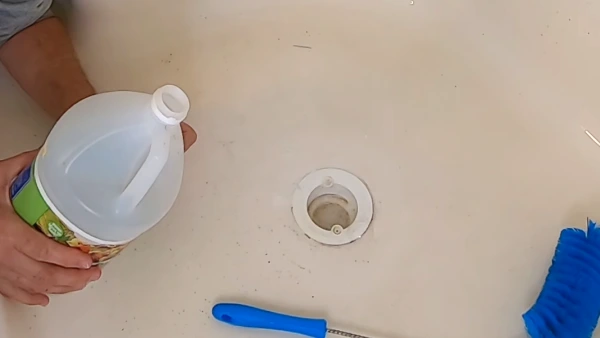
Regularly cleaning your shower drain at least once a month helps prevent odors from forming. By keeping up with maintenance, you can avoid the buildup of hair and soap scum that can lead to unpleasant smells. Depending on your usage and the level of debris, you may need to clean it more frequently.
Using methods like baking soda and vinegar or a drain snake can effectively remove clogs and keep your drain smelling fresh.
Is it effective to prevent shower drain odors by using an air freshener?
Using an air freshener in your bathroom can temporarily mask shower drain odors. You should understand that air fresheners only provide a short-term solution. They don’t address the underlying cause of the odor, which could be due to mold, clogs, or dry P-traps.
To effectively prevent shower drain odors, it’s essential to focus on regular cleaning, maintenance, and addressing any plumbing or drainage issues contributing to the problem. There needs to be more than air fresheners alone.
Find and Resolve Smelly Shower Drain Issues and Enjoy a Refreshing Shower Experience
The causes of a smelly shower drain can range from mold growth to clogged drains and dry P-traps. But each issue has its corresponding solution, and taking prompt action can ensure a refreshing and relaxing showering experience.
By addressing the root causes and following the suggested remedies, you can get rid of those unwelcome odors and create a healthy bathroom environment.
Don’t let a stinky shower drain dampen your day; take steps to keep your bathroom smelling fresh and inviting.

